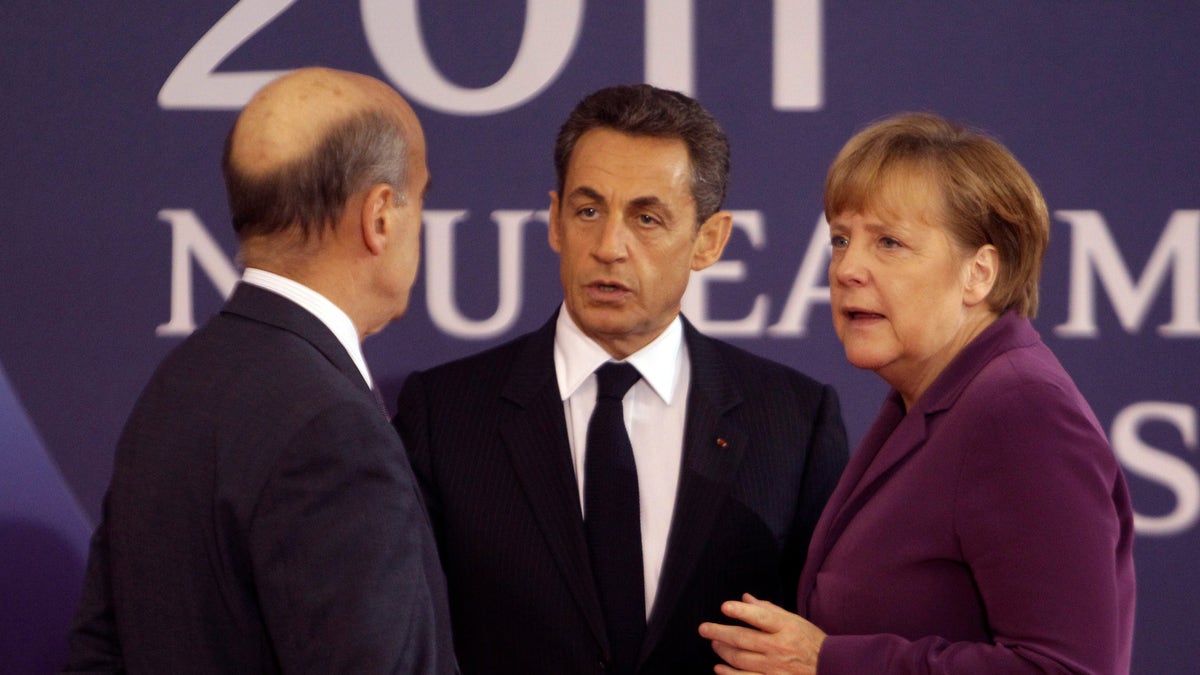
Nov. 2, 2011: French President Nicolas Sarkozy, center, and French Foreign Minister Alain Juppe, left, welcome German Chancellor Angela Markel at the G20 summit in Cannes. (AP2011)
PIERRELATTES, France -- French President Nicolas Sarkozy said Friday it would be madness to reduce his country's huge reliance on nuclear power, despite worldwide wariness after Japan's Fukushima disaster and protests this week over the dangers of waste.
As countries -- including neighboring Germany -- renounce nuclear energy in the wake of the tsunami-triggered meltdown at the Fukushima nuclear plant earlier this year, France has remained a bastion of atomic power. France depends on it for three-quarters of its electricity, more than any other country.
Sarkozy, expected to run for re-election in April against a leftist who wants to shut down French reactors, argued that abandoning nuclear energy would destroy jobs and cost billions that France cannot afford as it strains to rein in debts and reduce unemployment at nearly 10 percent.
"We do not have the right to break with the political consensus of the last 65 years at the risk of destroying jobs in French industry. It's madness," he told nuclear industry workers in southern France.
He spoke as German police were patrolling a train carrying nuclear waste reprocessed in France on its way to a controversial storage site that protesters say is unsafe.
French protesters clashed with riot police and damaged train track as the train tried to leave the reprocessing plant in the northern region of Normandy earlier this week. German police used water cannons late Thursday night on protesters trying to block a crossroads at Metzingen, near the destination in northern Germany, after fireworks and paint were thrown at officers.
It's the first shipment of nuclear waste from France to Germany since Berlin decided to shut all its nuclear plants by 2022, following the disaster at Fukushima. But officials haven't yet resolved where waste should be stored permanently, and activists argue the site in Gorleben, near the German town of Dannenberg, is unsafe.
In France, leaders on the left and right have been unswervingly devoted to nuclear energy for decades -- a strategic choice dating to the oil shocks of the 1970s.
That is, until now. The Socialist presidential candidate, Francois Hollande, has pledged to shut down more than 20 nuclear reactors, the boldest such proposal for any mainstream French party in the nuclear era. It's a sign of how far the political fallout from Fukushima has spread.
Sarkozy is hoping the economic crisis will trump fears about nuclear security. French consumers pay less then most Europeans for electricity.
Sarkozy has also argued that a rise in energy prices would hurt French factories and force more companies to move overseas to countries with cheaper labor.
Supporters of cleaner energy sources say windmill farms and solar facilities would create new jobs and that maintaining nuclear energy is also very costly -- notably because of the high price of keeping plants and nuclear material safe.
